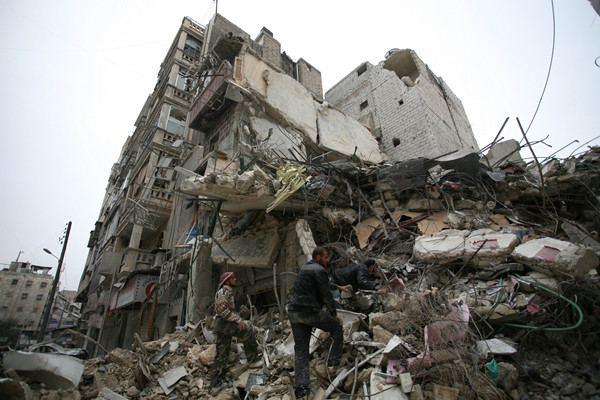Only a few hundred meters distance separate Aleppo from being surrounded
Published: Sep 18, 2014 Reading time: 5 minutes Share: Share an articleSyria faces the largest humanitarian catastrophe in the world today and hope for an early end to the war is still far off.

“This cannot continue. From the end of last year, tens of barrel bombs, barrels filled with explosives, fall down here every day and from day to day we count new bodies. All of my relatives have already fled, my husband died during the bombing last year in May. We rely on help from the outside, but there is less available all the time,” said Samar, forty-year-old mother of four, one of millions of average people, whom the Syrian war affects for four years now. “For the past few months, you can only enter Aleppo twice a day, early in the morning and at dusk. During this time, for an hour or two, the bombing and shelling stops,” the woman continues. “One can only look at the sky, so that they don’t walk under helicopters, which drop the killer barrel bombs, wherever they want to. At that time, people flee the city and the trucks with supplies arrive, which are never enough for everyone,” she adds.
Aleppo, the second largest Syrian city, which had three million inhabitants before the war, is only a few hundred meters distance from being surrounded. The opposition’s army controlled territory is connected to Aleppo only by the last remaining road from the north, other roads and front lines are controlled by the army of President Assad. Sections of the city controlled by the opposition were inhabited by a million and a half people half a year ago, today it is estimated there are only three hundred thousand. The poorest, have nowhere to go, including Samar.
Majority in Poverty
Not only people in Aleppo are missing medical help. Only a third of the injured or seriously ill get any medication, over three years there’s no vaccination and the chronically ill like diabetics or cardiacs die in the hundreds without access to treatment. Half of the hospitals lie in ruins, two thirds of women give birth at home or in abandoned buildings. Every other Syrian is now without a home - six and a half million people survive in the ruins of former schools, farms, factories or under the sky. Another nearly three million have fled over the border. A full 10.8 million people, 59% of the population, urgently require humanitarian assistance. This is only provided to less than a half. The ground is destroyed and scattered, 80% of people are unemployed and three out of four Syrians live under the poverty line. Prices of all goods have risen a couple fold and there is a shortage of everything; people do not have access to food and assets to be able to purchase other essential items. Everything they had they sold and the majority do not have any sustainable income.
#~gallery-798~#
Besides medical help, people especially need food. The war has destroyed agriculture and the dry weather wasted the rest. There is a large shortage of water due to the bombed infrastructure. “We have access to water once every ten days, for a few hours. We always try to get a few canisters, with which have to use then. We also visit old wells, where we try to extract the rest of the water. It is dirty, from the bottom, but when times are bad we have to even drink it,” said Samar describing the situation in Aleppo. Water is also strategic for the warring sides, they fight for waterworks and purifiers. They seek to prevent water supplies from reaching enemy territory and entire systems are then permanently destroyed, as happened even in Aleppo.
Failure of Global Diplomacy
Syria is now split between armies of the regime, opposition consisting of many independent brigades and the Islamic State (IS), an extremist organisation previously allied with al-Qaeda. IS arrived in Syria last year and today controls over a third of the country. They took the territory mainly with weapons which they salvaged from occupying areas of Iraq this spring. Assad’s regime controls more than half of Syria and the rest of the Syrians live in places controlled by the opposition. At the end of July, the Islamic State has declared a caliphate on the territory it seized in Iraq and Syria and imposed strict rules based on Sharia law. It controls everything - from collection of taxes, food supplies, schools and legal matters. It does not tolerate any other religion except for Sunni Islam. Christians, Shiites and other religious minorities have only three choices - escape, convert or pay large taxes. They cannot pray in public or display their beliefs to others, but even then they are publicly and collectively executed. The established legal system allows cutting off hands for stealing, jailing or even execution for smoking, insufficient veiling of women or work on Friday, when everyone has to pray. Compliance is ensured by the secret police.
You can donate to the SOS Syria account 92329232/0300
(IBAN CZ1703000000000092329232)
CARD PAYMENT HERE
Syrians inside the caliphate live under massive oppression, in opposition areas under government bombing and regime areas under a dictator. They do not have much choice and everyone hopes for the same - end of war and help until then. For three years, international humanitarian help from the UN could not reach half the areas that were not controlled by the Damascus government. The UN Security Council could not agree to a resolution due to blocking by Russia and China, which would allow help to reach everyone. World diplomacy has failed here. Until July of last year, the situation stayed the same. Even areas outside control of the Assad regime are starting to receive first supplies of aid from the UN. Until that time, northern areas were especially reliant on help from several NGOs.
